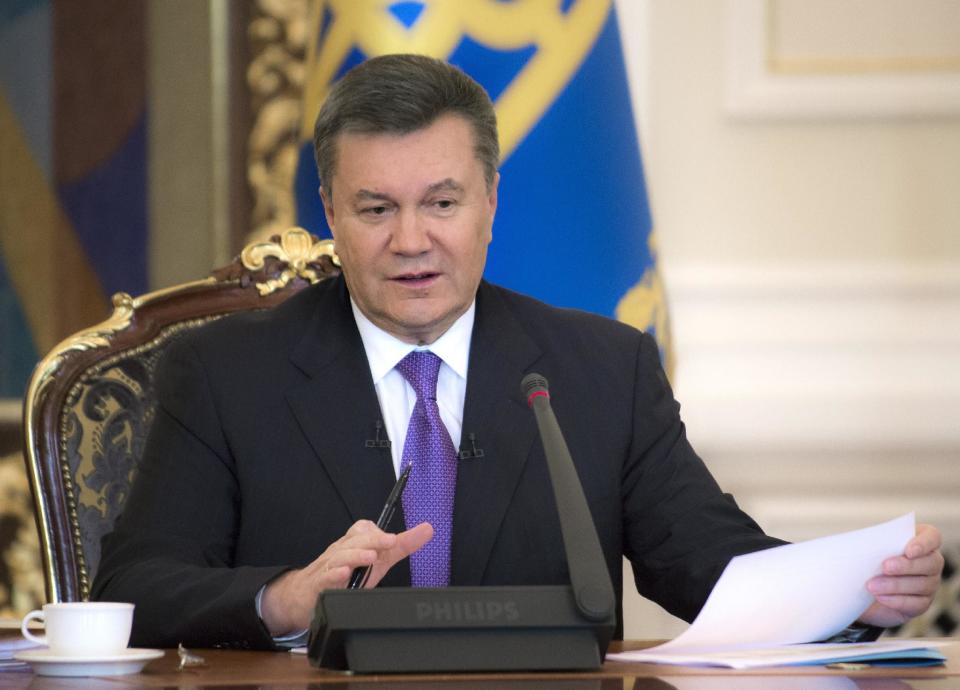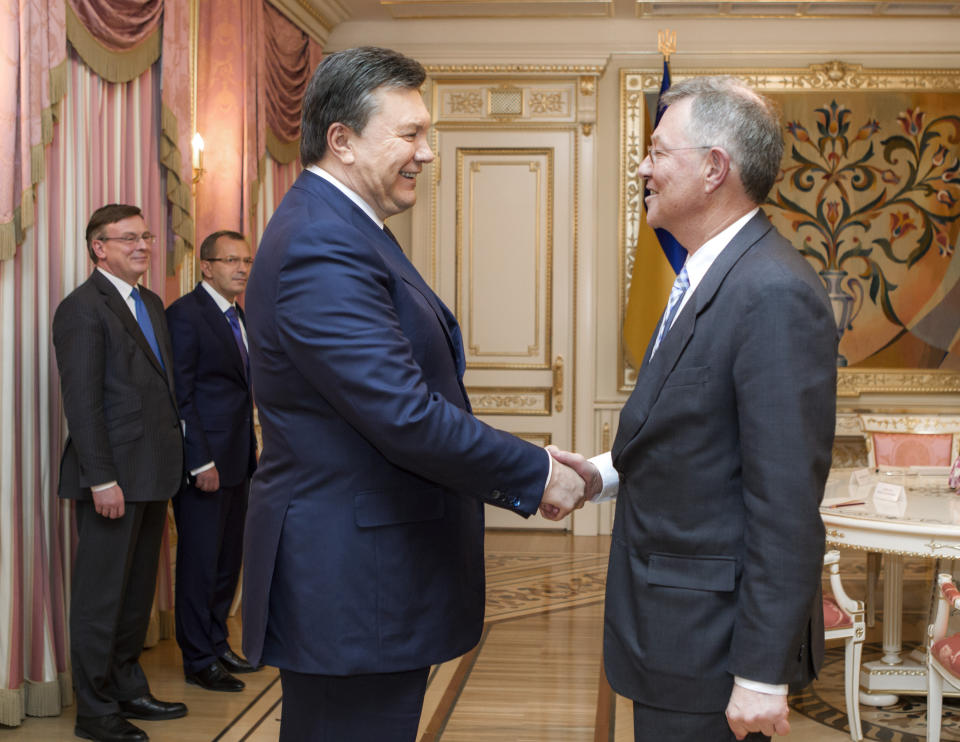Ukrainian president takes sick leave amid crisis
KIEV, Ukraine (AP) — Ukraine's embattled president is taking sick leave, his office announced Thursday, a surprise development that left unclear how efforts to resolve the country's political crisis would move forward. Protesters have been calling for his resignation for two months.
A statement on the presidential website said the 63-year-old Viktor Yanukovych has an acute respiratory illness and a high fever. There was no indication of how long he might be on leave or whether he would be able to do any work. He was not known to have any previous health issues.
The announcement prompted skeptical reactions and even the suggestion that it was a ruse to take him out of power — as in the attempted coup against Soviet leader Mikhail Gorbachev in 1991.
"I don't remember official statements on Viktor Yanukovych's colds. But I remember well, when on Aug. 19, 1991, the vice president of the USSR, Gennady Yanayev, announced the serious illness of Mikhail Sergeyevich Gorbachev," political commentator Vitaly Portnikov wrote on his Facebook page.
Gorbachev's purported illness was reported on Aug. 19, 1991, as hardline Communists opposed to his reforms attempted an unsuccessful coup against him and held him under house arrest. Although the coup failed, it accelerated the collapse of the Soviet Union, which officially was dissolved four months later.
Yanukovych has faced two months of large protests that have often paralyzed Kiev, the capital. The protests started after he backed out of a long-awaited agreement to deepen ties with the European Union, but quickly came to encompass a wide array of discontent over corruption, heavy-handed police and dubious courts.
Despite offering several concessions, authorities have so far failed to mollify the protesters.
In a series of moves aiming at resolving the crisis, parliament voted Tuesday to repeal harsh anti-protest laws. Yanukovych must formally sign that repeal and it was unclear whether he could do so while on sick leave.
He also has accepted the resignation of his prime minister. But protesters say the moves are insufficient — they want him out and new elections held.
Yanukovych made a late-night visit to the parliament Wednesday before it passed a measure offering amnesty to some of those arrested in the two months of protests. That new law, however, was only valid if demonstrators vacate most of the government buildings they occupy in Kiev and in some western cities. The offer was quickly greeted with contempt by the opposition, which regards the arrests during the protests as fundamentally illegitimate.
There are conflicting figures on how many protesters are now in custody. One opposition lawmaker said Wednesday there were 328, whom he characterized as "hostages." But the prosecutor-general's office said Thursday there were 140.
The protests had been mostly peaceful until mid-January, when demonstrators angered by the new anti-protest laws launched violent clashes with police near the Ukrainian parliament. Three protesters died in the clashes, two of them from gunshot wounds. Police insist it was not from their guns.
On Thursday, Interior Minister Vitali Zakharchenko said a 30-year-old policeman at the protest front lines in Kiev had died of a heart attack overnight. Although there have been no clashes there for several days, tensions at the site are heavy. Zakharchenko said the policeman's death was "a consequence of the daily stress."
Protesters are demanding Yanukovych's resignation, early elections and the firing of authorities responsible for the violent police dispersals of demonstrators.
The new bill would not apply to several city buildings in the center of Kiev that the protesters use as dormitories and operation centers to support the extensive protest tent camp on the city's main square. With temperatures dropping as low as -20 Celsius (-4 Fahrenheit) during the night, continuing the protests without some shelter would be virtually impossible.
But the Kiev city hall building, as well as regional administration ones seized by protesters in western Ukraine, would have to be vacated, according to the Unian news agency.
After stepping back from the agreement with the EU, Yanukovych got a $15 billion aid package from Russia that also gives Ukraine lower prices for the Russian gas upon which the country depends. That aid from Russian President Vladimir Putin is key to propping up Yanukovych and keeping the struggling Ukrainian economy from bankruptcy.
But as the crisis drags on, concerns are rising about whether Russia will keep its financial commitment if the Yanukovych regime collapses.
Putin said Wednesday the aid would still be valid, but suggested that delivery of the next tranche could be delayed until the formation of a new Ukrainian government. That appeared to refer to waiting until a new prime minister is named.
___
Maria Danilova in Kiev contributed to this report.


